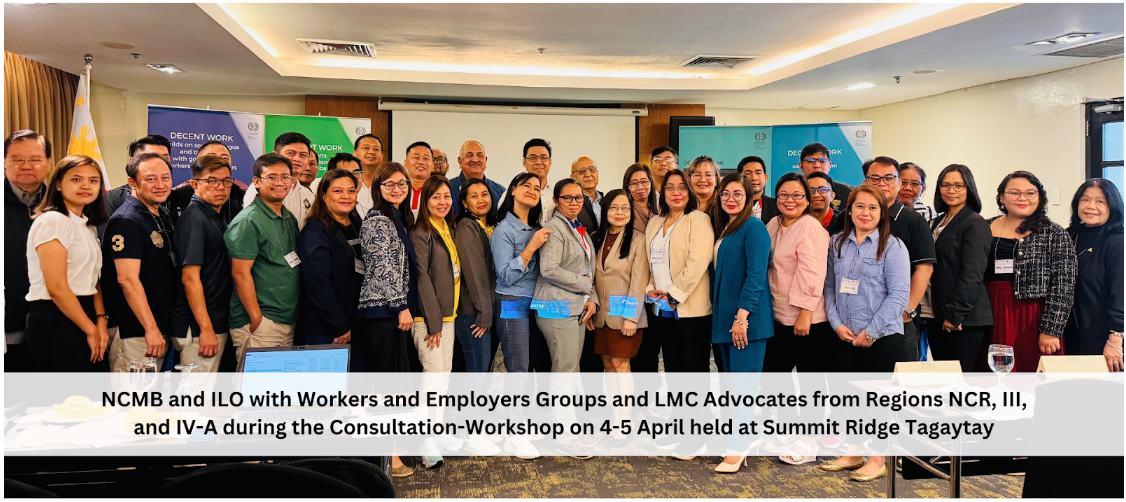 Tagaytay City, Cavite – Aimed at building shared understanding on the role of workplace consultations, cooperation and collective bargaining in strengthening industrial relations, the National Conciliation and Mediation Board (NMCB) and the International Labour Organization (ILO) recently pulled off a Consultation-Workshop on Labor-Management Cooperation (LMC) held on 4-5 April at Summit Ridge Tagaytay. The Consultation-Workshop was attended by representatives from select Labor-Management Councils/Committees (LMCs) in Luzon, and workers and employers organizations.
Tagaytay City, Cavite – Aimed at building shared understanding on the role of workplace consultations, cooperation and collective bargaining in strengthening industrial relations, the National Conciliation and Mediation Board (NMCB) and the International Labour Organization (ILO) recently pulled off a Consultation-Workshop on Labor-Management Cooperation (LMC) held on 4-5 April at Summit Ridge Tagaytay. The Consultation-Workshop was attended by representatives from select Labor-Management Councils/Committees (LMCs) in Luzon, and workers and employers organizations.
The event was graced by ILO-Manila Country Director Khalid Hassan and Department of Labor and Employment (DOLE) Assistant Secretary Lennard Constantine Serrano.
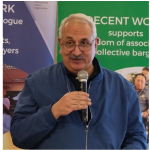 In reference to one of ILO’s priorities under its Decent Work Country Programme, which is to promote harmonious industrial relations, Director Hassan stressed how the growth and competitiveness of the Philippine industry is held back due to decent work challenges and conflicts in industrial relations. As a way to address these, he emphasized the importance of the constructive role of LMCs in contributing to company productivity and workers’ welfare, and maintenance of industrial peace without undermining the trade union rights of the workers.
In reference to one of ILO’s priorities under its Decent Work Country Programme, which is to promote harmonious industrial relations, Director Hassan stressed how the growth and competitiveness of the Philippine industry is held back due to decent work challenges and conflicts in industrial relations. As a way to address these, he emphasized the importance of the constructive role of LMCs in contributing to company productivity and workers’ welfare, and maintenance of industrial peace without undermining the trade union rights of the workers.
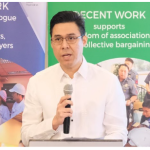 DOLE Assistant Secretary Serrano enthusiastically inspired and challenged the LMC advocates present to be instruments in propagating the cause of enterprise-level bipartite mechanisms in order for LMCs to permeate every workplace in the country.
DOLE Assistant Secretary Serrano enthusiastically inspired and challenged the LMC advocates present to be instruments in propagating the cause of enterprise-level bipartite mechanisms in order for LMCs to permeate every workplace in the country.
As a show of government’s support, he concluded his address by ensuring that the DOLE, through the NCMB, will continue to provide the necessary assistance to the LMC practitioners and advocates as they impact the workplace towards business viability and profitability, and to the ILO in completing its Decent Work Country Programme in the Philippines.
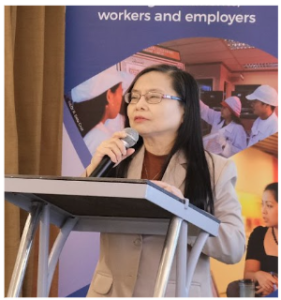 Highlighting the benefits enjoyed by companies that have embraced the concept of workplace cooperation, NCMB Executive Director Maria Teresita D. Lacsamana-Cancio, herself a proponent of LMC for 29 years, proudly enthused, “The LMC program of NCMB is real and indeed working wonders in workplaces.” She underscored NCMB’s belief in the shared responsibility of both workers and employers in the success of the enterprise that it puts premium on its LMC and Grievance Machinery (GM) programs. “I said it before and I will say it again: LMC is never a waste of time, rather, it is time well spent.”
Highlighting the benefits enjoyed by companies that have embraced the concept of workplace cooperation, NCMB Executive Director Maria Teresita D. Lacsamana-Cancio, herself a proponent of LMC for 29 years, proudly enthused, “The LMC program of NCMB is real and indeed working wonders in workplaces.” She underscored NCMB’s belief in the shared responsibility of both workers and employers in the success of the enterprise that it puts premium on its LMC and Grievance Machinery (GM) programs. “I said it before and I will say it again: LMC is never a waste of time, rather, it is time well spent.”
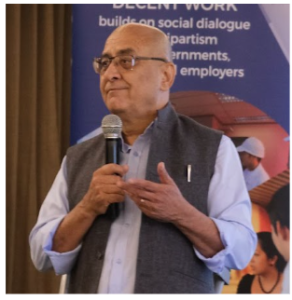 The Consultation centered on discussing the key industrial relations challenges at the workplace from employers’ and workers’ point of view to identify priority agenda for follow up initiatives in achieving industrial peace, productivity, and decent work.
The Consultation centered on discussing the key industrial relations challenges at the workplace from employers’ and workers’ point of view to identify priority agenda for follow up initiatives in achieving industrial peace, productivity, and decent work.
Mr. Arun Kumar, Collective Bargaining and Social Dialogue Specialist, introduced how shared understanding and decent work go hand-in-hand as negotiated solutions based on mutual interests worked out better than those imposed by law. “Move industrial relations from conflict to dialogue,” said Mr. Kumar.
Where are we now?
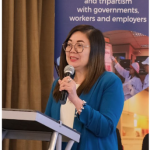 Workplace Relations Enhancement Division (WRED) Chief Julie Rodriguez emphasized the role of LMCs in enhancing and sustaining non-adversarial employment relations in various organizations, citing that maintenance of industrial peace can be attributed to a well-functioning bipartite dispute resolution mechanism with which several programs and projects are mapped out.
Workplace Relations Enhancement Division (WRED) Chief Julie Rodriguez emphasized the role of LMCs in enhancing and sustaining non-adversarial employment relations in various organizations, citing that maintenance of industrial peace can be attributed to a well-functioning bipartite dispute resolution mechanism with which several programs and projects are mapped out.
While the NCMB religiously fulfills its mandate to further its promotional initiatives, LMC advocacy and sustainability are faced with compelling challenges, such as the tendency of some companies to put LMC aside, employee turnover and attrition, volatile economy and work landscape, and misconceptions on LMC.
Guided by the struggles and challenges presented, the participants were broken into workshop groups and given the opportunity to discover and explore key industrial relations and human resource policies and practices that hinder the development of effective workplace consultation and cooperation culture in their respective workplaces. Some of those mentioned were lack of transparency, slanted decision making, absence of mutual trust and respect, to name a few.
What’s next?
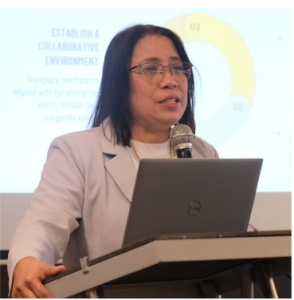 Deputy Executive Director Teresita E. Audea summed up the solutions and assistance identified by the participants in addressing the hindrances. Among those brought up were: (1) capacity-building training, (2) effective information dissemination mechanisms, (3) intensifying the setting-up and monitoring of LMCs and GMs and, (4) formulation of policies that would help enterprises accept and embrace the LMC and GM concepts.
Deputy Executive Director Teresita E. Audea summed up the solutions and assistance identified by the participants in addressing the hindrances. Among those brought up were: (1) capacity-building training, (2) effective information dissemination mechanisms, (3) intensifying the setting-up and monitoring of LMCs and GMs and, (4) formulation of policies that would help enterprises accept and embrace the LMC and GM concepts.
In response, ED Cancio assured the LMC champions and the ILO that NCMB’s efforts are geared towards engaging the workers and employers in the quest for sound and stable workplace relations. “All the activities and interventions you proposed are already being done by NCMB but we will have to step up to widen our reach to make sure that more companies will be aware of NCMB’s programs,” said ED Cancio.
To conclude the pivotal event, ED Cancio encouraged all LMC practitioners in attendance to make “Adopt-a-Company” as one of their advocacies to stimulate other companies to establish their LMC.
For more information about this article, you may email wred_co@ncmb.gov.ph or call (02) 8252-6262 local 745.
END/ Mary Khryz Maxine C. Laxina





 Views Today : 652
Views Today : 652 Total views : 612338
Total views : 612338

